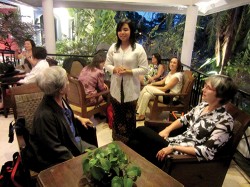For the second time this year Portland State participated in the United States Higher Education Delegation to Indonesia—an effort to build partnerships with the country ranging from economic and diplomatic to higher education.
PSU connects with Indonesia
For the second time this year Portland State participated in the United States Higher Education Delegation to Indonesia—an effort to build partnerships with the country ranging from economic and diplomatic to higher education.

COURTESY OF US INDONESIA JOINT COUNCIL ON HIGHER EDUCTION PARTNERSHIP
Patricia Wetzel (right) attends a high tea during the delegation to Indonesia.
Patricia Wetzel, director of PSU’s Institute for Asian Studies, represented PSU for the weeklong trip earlier this month. Along with representatives from 10 other colleges and universities from across the United States, Wetzel traveled to different schools in Indonesia and met with academic and government officials.
One focus of the recent delegation was to help Indonesia develop a community college system similar to that in the U.S.
Wetzel explained that there are many vocational schools in Indonesia, but nothing to compare to the matriculation process many U.S. students experience.
“Here you can start at MIT and transfer to PSU, then Chemeketa Community College, and your credits follow you,” she said. The concept of attending multiple schools is one that Indonesians sometimes have a hard time understanding.
In order to familiarize them with the process, Wetzel mentioned developing what’s called a “sandwich program.” This would entail Indonesian students beginning their studies at a school in their home country, coming to a U.S. community college for one year, transferring to PSU for a year and then completing their studies back home where they started.
Indonesia is one of the world’s fastest-growing economies. Currently it’s 16th, but is expected to jump to seventh by 2030. It boasts the world’s fourth-largest population and the largest Muslim population of any one country. As the third-largest democracy in the world, it challenges perceptions about Muslim society.
In 2010 President Barack Obama signed a joint declaration with Indonesian President Susilo Bambang Yudhoyono in an effort to strengthen bilateral relations between the two nations. Part of the declaration included the creation of a U.S.-Indonesia Council for Higher Education Partnership.
The United States-Indonesia Society, based in Washington, D.C., was one of the founding members of the joint council. Earlier this year the group elicited universities interested in sending representatives to Indonesia as part of the initial delegation in April.
PSU expressed interest and sent Jonathan Fink, vice president for research and strategic partnerships.
“In both my case and Dr. Wetzel’s, the goals [were] to build connections with Indonesian universities and high schools in order to attract more Indonesian students to PSU, establish collaborations with Indonesian researchers and potentially open doors for Oregon companies to find economic opportunities in Indonesia,” Fink said in an email.
PSU has already made similar connections in Vietnam and the Persian Gulf.
Fink’s trip focused on topics such as Islamic finance and conservation biology.
Bernie Burrola, executive director of the U.S.-Indonesia Joint Council on Higher Education Partnership, summed up PSU’s experience with the two delegations this year.
“Portland State has now had the opportunity to visit 15 Indonesian universities, between the two delegations, and meet with over 100 Indonesian higher education officials,” he said in an email.
This includes what is called a memorandum of understanding with Gadjah Mada University in Yogyakarta, Indonesia. This is a document that expresses mutual interest in pursuing a relationship based on common interests.
PSU now has direct contact with Indonesian university presidents and greater publicity within Indonesia, Burrola added.
Burrola mentioned several challenges in forging bilateral educational ties with Indonesia.
For example, the U.S. has a decentralized educational system that allows schools to create institutionally tailored curricula and to do so quickly. Indonesia’s system is highly centralized; changes to curricula require Ministry of Education approval.
Another example is a simple imbalance of understanding.
“Indonesians regularly read about the U.S. in their newspapers and therefore have a stronger understanding of the U.S. Americans, on the other hand, rarely read or hear about Indonesia,” he said.
On Wetzel’s trip, the group met with representatives of the Indonesian Ministry of People’s Welfare about bringing 15 graduate students to Oregon universities, including PSU.
There was additional discussion about undergraduate exchange programs.
Wetzel mentioned getting in touch with Indonesian schools to explain options for their students to come to PSU. There is hope that the exchange process can be streamlined, whether it’s for short-term or full-year programs.
Indonesia is not a place U.S. students typically go when on exchange. There are a lot of Australian and European students who go, though, and Wetzel said she would like to see Indonesia become a bigger target for American students as well.
“The United States is still what people aspire to in terms of higher education,” Wetzel said. The experience that Indonesian students would get in the U.S. and the experience U.S. students would take with them to Indonesia would be beneficial to both countries.




